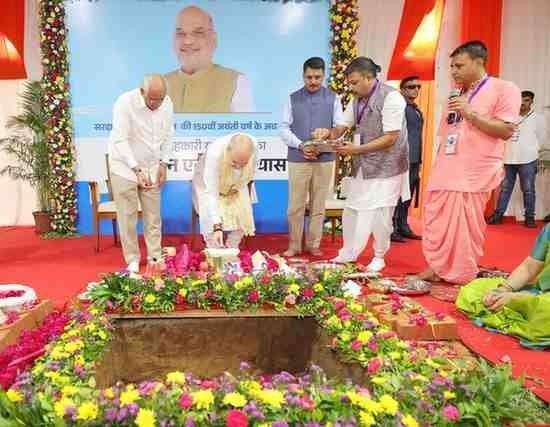Anand, Gujarat: Union Home Minister and Minister of Cooperation Shri Amit Shah today performed the Bhoomi Poojan (groundbreaking ceremony) of India’s first cooperative university — “Tribhuvan” Sahkari University — in Anand, Gujarat.
The historic event marked a major step forward for India’s cooperative sector and was attended by several prominent dignitaries including Gujarat Chief Minister Shri Bhupendrabhai Patel, Union Ministers of State for Cooperation Shri Krishan Pal Gurjar and Shri Muralidhar Mohol, as well as Dr. Ashish Kumar Bhutani, Secretary, Ministry of Cooperation.
In his address, Shri Amit Shah hailed the day as a landmark for India’s cooperative movement, noting that Prime Minister Narendra Modi has paid true tribute to Tribhuvan Das Patel Ji — a pioneer of India’s cooperative dairy revolution — by naming the university after him.
Nr. Shah highlighted the establishment of the Ministry of Cooperation four years ago as a transformative initiative aimed at uplifting millions of rural and poor Indians through economic empowerment.
Strengthening Cooperative Movement
Shah stated that since its inception, the Ministry of Cooperation has introduced 60 new initiatives to enhance transparency, inclusiveness, and sustainability in the cooperative sector.
The vision, he said, is to make the cooperative movement more democratic, women-inclusive, and youth-driven. With over 30 crore people associated with cooperatives in India — nearly one-fourth of the population — this movement is a powerful engine for grassroots development.
He emphasized that “Tribhuvan” Sahkari University would address long-standing challenges faced by cooperatives, especially the lack of structured training for employees and leadership.

Built on a 125-acre campus at a cost of ₹500 crore, the university aims to become a hub of knowledge, skill-building, and innovation in the cooperative domain.
Focus on Education, Employment, and Transparency
The Union Minister remarked that previously, employees of cooperative institutions received training only after recruitment, which often led to nepotism and inefficiency.
However, with the launch of this dedicated university, only trained professionals will be eligible for employment in the cooperative sector. The move is expected to instill transparency and eliminate favoritism.
He added that students at the university will be taught a combination of technical subjects such as accounting, marketing, and data analysis, alongside the core values of cooperation.
This blend of skill and spirit, Shah said, will nurture a new generation of leaders who understand the needs of Dalits, tribals, and women — the key beneficiaries of the cooperative model.
Filling Gaps in Manpower and Policy
Highlighting the urgent need for trained manpower, Shah said the government plans to establish two lakh new Primary Agricultural Credit Societies (PACS), 60,000 of which will be formed by the end of this year. These PACS alone will require 17 lakh employees, all of whom can be trained through the university.
He also said that cooperative dairies, which are growing in number across districts, would benefit immensely from a steady stream of well-trained personnel.
The university will also contribute to policymaking, strategic planning, and research — creating roadmaps for 5, 10, and 25 years for the cooperative sector’s future growth.
Honouring the Legacy of Tribhuvan Das Patel
In a heartfelt tribute, Shah emphasized that the university is rightly named after Tribhuvan Das K. Patel, the visionary who, under Sardar Vallabhbhai Patel’s guidance, laid the foundation for India’s cooperative dairy movement.
It was Tribhuvan Das Ji who initiated the Kheda District Cooperative Milk Producers Union in 1946, a modest beginning that evolved into the global dairy brand Amul.
The Minister recalled how Patel’s grassroots campaign empowered farmers, especially women, and challenged the exploitative regime of private players like Polson Dairy.
Today, 36 lakh women are part of the Amul network, collectively conducting business worth ₹80,000 crore — all starting with contributions of less than ₹100 each.
Cultural and Strategic Significance
Shah linked the cooperative ethos with India’s civilizational values of Vasudhaiva Kutumbakam (the world is one family) and Sarve Bhavantu Sukhinah (may all be happy), stating that these principles lie at the heart of India’s approach to inclusive development. Cooperation, he said, goes beyond economics — it is about human dignity, animal welfare, and environmental sustainability.
He further announced that the CBSE has introduced ‘Cooperation’ as a subject in Classes 9 to 12. Shah urged the Gujarat government to follow suit and include it in the state curriculum to raise awareness about the significance of cooperatives among students.
Vision for the Future
The university, Shah explained, is not just a center for academic learning but a crucible for producing visionary cooperative leaders who can spearhead transformative change.
The curriculum will be standardized nationwide to ensure consistency in cooperative training. In addition, the university will serve as a platform for innovation and policymaking while acting as a launchpad for implementing various schemes through both new and existing PACS.
Plans are also underway to diversify the cooperative landscape by launching new initiatives such as cooperative taxi services and cooperative insurance companies.
All of these ventures will require skilled professionals and visionary leaders trained in specific sectors — something the university is designed to provide.
Shah called upon cooperative experts from across India to join hands with Tribhuvan Sahkari University and contribute to its mission. “This university will plug the vacuum that has hindered the cooperative movement and will give it a fresh, powerful direction,” he said.
Transforming Cooperatives into a National Movement
In conclusion, the Union Minister asserted that the university is a revolutionary step toward transforming the cooperative sector into a mass movement.
It will produce a new generation of skilled professionals, policy architects, and ethical leaders capable of steering India’s cooperative model on the global stage.
He reiterated that India is poised to become a global epicenter of cooperative enterprises and that Tribhuvan Sahkari University will be the catalyst in realizing this vision.
As India moves forward with a strong foundation of cooperation, inclusivity, and empowerment, the cooperative movement is set to play a defining role in shaping the nation’s socio-economic future.








